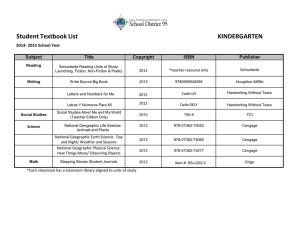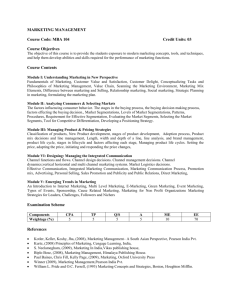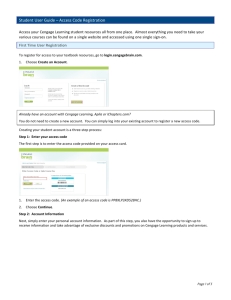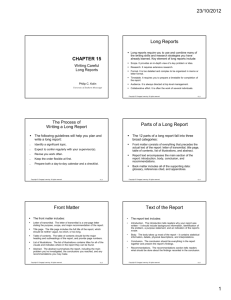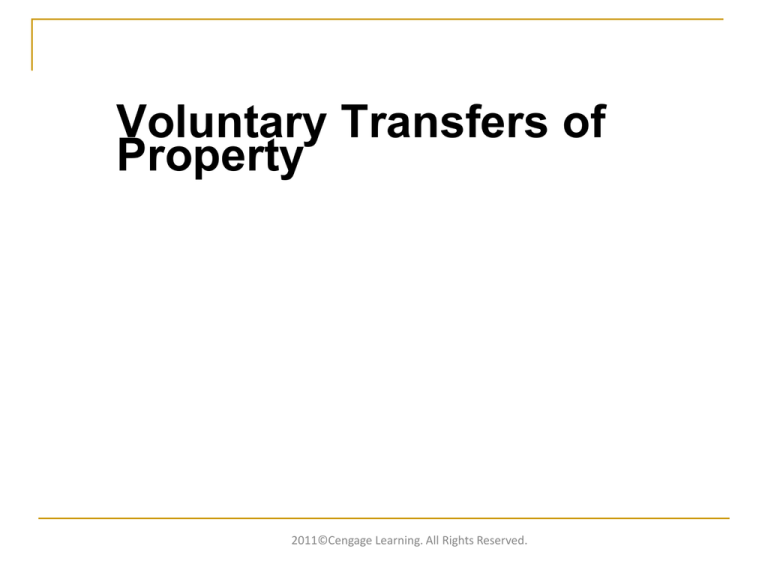
Voluntary Transfers of
Property
2011©Cengage Learning. All Rights Reserved.
Nature of Deeds
An
instrument used to
transfer title to real estate.
2011©Cengage Learning. All Rights Reserved.
TYPES OF DEEDS
Grant Deed
Quitclaim Deed
Warranty Deed
2011©Cengage Learning. All Rights Reserved.
Warranties
Grant deeds the grantor warrants not to
have previously conveyed the same interest
to someone else.
And not to have previously encumbered the
property.
2011©Cengage Learning. All Rights Reserved.
Warranties
A quitclaim deed contains no warranties
whatsoever.
Commonly used to clear title when the
grantor has no real interest to convey.
2011©Cengage Learning. All Rights Reserved.
Warranties
Warranty deeds guarantee that there
are no encumbrances against the
property & that no one will disturb the
peaceful, quiet possession of the
grantee.
The grantor agrees to defend the
warranties in a lawsuit or otherwise.
Rarely used in California.
2011©Cengage Learning. All Rights Reserved.
Warning to Brokers
Many deposit receipts state that title is to be
free from all liens & encumbrances except
those listed.
The broker must be extremely cautious to
check title & to list documents of record &
taxes due but not yet of record.
2011©Cengage Learning. All Rights Reserved.
Basics of Valid Deed
1. Written document
2. Signature of competent grantor
3. Grantee capable of holding title
4. Description of property
5. Operative words of conveyance
6. Delivery
7. Acceptance
2011©Cengage Learning. All Rights Reserved.
Other Elements
Consideration Not Required
Recording Not Required
Acknowledgment
2011©Cengage Learning. All Rights Reserved.
Requirements
Competent Grantor
Agent Signing
Using Powers of Attorney
Competent Grantee
Adequate Property Description
2011©Cengage Learning. All Rights Reserved.
More Requirements
Words of Conveyance
Legal Delivery
Example of delivery
Presumptions on Delivery
Acceptance
2011©Cengage Learning. All Rights Reserved.
Types of Wills
Witnessed Will
Formal
Witnessed
Statutory Will
Holographic Will
2011©Cengage Learning. All Rights Reserved.
Intestacy
Testate (with will)
Intestate (without will)
Laws of intestate succession
2011©Cengage Learning. All Rights Reserved.
Community Property
All community property passes to the
surviving spouse, regardless of any
children or other heirs.
2011©Cengage Learning. All Rights Reserved.
Separate Property
1. One-half to surviving spouse; one-half to
child
2. One-third to surviving spouse; two-thirds
equally to children
3. All to children if there is no surviving spouse
2011©Cengage Learning. All Rights Reserved.
Separate Property
4. One-half to surviving spouse; one-half to
parent, if there are no children
5. All to collaterals (aunts, uncles, cousins),
only if there are no parents, brothers, sisters,
nephews, nieces, children, grandchildren, or
surviving spouse
2011©Cengage Learning. All Rights Reserved.
Will Terms
Testate
Intestate
Testator
Executor
2011©Cengage Learning. All Rights Reserved.
More Will Terms
Administrator
Devise
Bequest
Legacy
2011©Cengage Learning. All Rights Reserved.
Will Terminology
Ambulatory
Codicil
2011©Cengage Learning. All Rights Reserved.
Escheat
When
there are no heirs, the
property passes to the state.
2011©Cengage Learning. All Rights Reserved.
LAND SALES CONTRACTS
Seller’s Right & Duties
Buyer’s Rights & Duties
Reasons for Demise
Trustee’s Sale
2011©Cengage Learning. All Rights Reserved.
Advantages & Disadvantages to Seller
Buyer’s interest can be expeditiously and
inexpensively terminated.
Contract may provide a means of selling
property without paying an assumption fee or
facing an acceleration of an existing loan.
The seller must clear title.
2011©Cengage Learning. All Rights Reserved.
Advantages & Disadvantages to Buyer
Possibility of recovery of part of the payments
over the amount of the seller’s damages.
Possibility of purchasing the property with an
existing loan without changing interest rate.
Judgment lien will not attach to the buyer’s
equitable title.
Difficulty in obtaining financing from lenders.
2011©Cengage Learning. All Rights Reserved.

